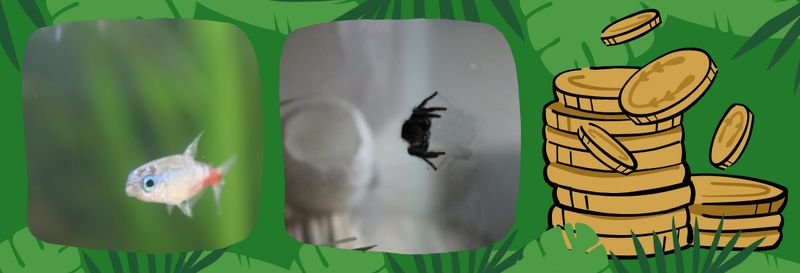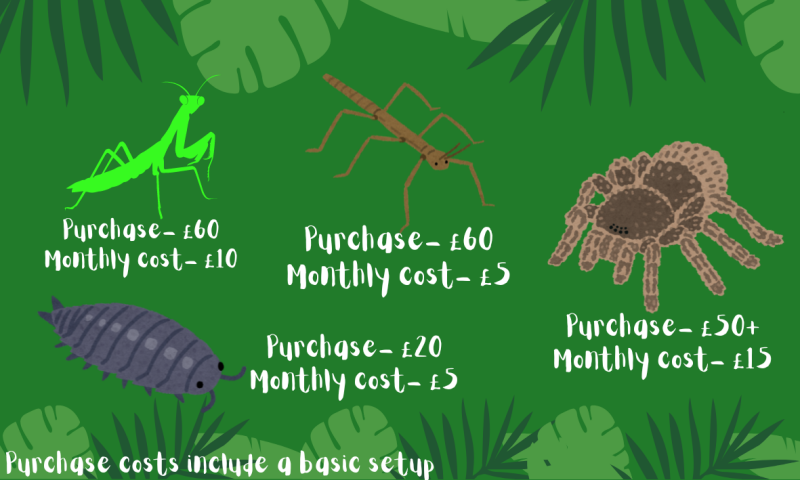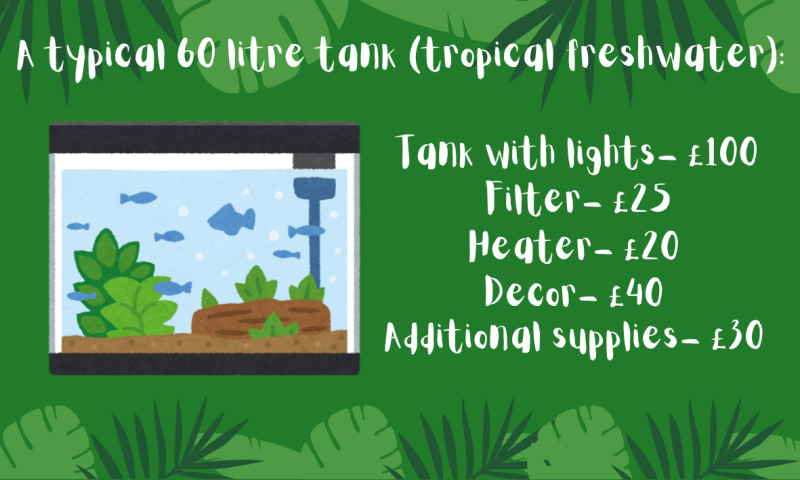Budget pets

Updated 06/09/2024
Pets- especially exotic species- are becoming more popular than ever. It is thought at least 3 million exotic animals are kept in the UK alone! Despite their popularity, the ‘hobby’ is still incredibly expensive, requiring a constant supply of money to meet the animal’s welfare needs. Enclosures, enrichment, food, electricity, heating, vet bills- all examples of costs associated with pet ownership, some of which cannot even be planned for.
Pet ownership can be made available to anyone, provided they can support the welfare of an animal by meeting legal requirements. In the United Kingdom, we can easily summarise these through the 5 welfare needs (Animal Welfare Act 2006). These are:
-
The need for a suitable environment
-
The need for a suitable diet
-
The need to be able to exhibit normal behaviour patterns
-
The need to be housed with, or apart from, other animals
-
The need to be protected from pain, suffering, injury, and disease
The following article will explore some of the ways you can reduce the costs of pet ownership, whilst also looking at some of the most ideal species to keep on a budget. Any figures on this page are rough guides- there are several other factors to consider.
Invertebrates:
There are more than a million species of invertebrate found on our planet- surely there’s a species anyone can love? In general, the invertebrate group gets bad press, these spineless ‘creepy-crawlies’ feared by many, but get to know them and you’ll find some are incredible creatures! Another benefit is that the majority of species will only require basic accommodation, with low ongoing care costs.
One of my favourites is the mantis. Mantids are predatory insects found right across the world. Their menacing yet beautiful appearance often attracts keepers, making them a popular choice. In addition, many species are readily available at a low cost and can thrive in even the simplest of budget enclosures. Hardy species, such as the Giant Asian Mantis or African Lined Mantis are brilliant additions to the home.
Similarly, stick insects can offer an enthralling pet option without breaking the bank. Again, several species are available, the most common of which is the Indian Stick Insect. These require very little care, and if you have suitable plants- such as bramble- nearby, their food will cost you nothing! If you’re looking for a pet on a budget, you won’t find anything better than a stick insect!
Isopods are another good choice for those looking for a critter with low running costs, and easy husbandry. You may know these arthropods as ‘Rolly-polly bugs’, ‘Cheese bugs’, ‘woodlice’, or by any number of other weird and wonderful names. They’re a familiar sight in gardens across the world, typically found beneath wood, rock, or leaf litter. Some species, such as the Clown Isopod, are incredibly pretty, with colours and patterns rivalling even the most expensive reptiles. Isopods are also commonly used for bioactive reptile enclosures, or even live food, so setting up your own colony could even help reduce setup and food costs for any other animals you may have.
Our final ‘budget’ invertebrates are the arachnids: spiders and scorpions. They're certainly not for everyone, but if you can look past all the legs, the venom, and the menacing faces, they can prove to be the ideal pet. Many tarantula and scorpion species are readily available, with the most common species being well within the budget of most potential keepers. Generally, only a small and basic setup is required, which also helps to reduce the associated costs. If a tarantula seems a little too much to take on, there are hundreds of other spider species available as pets, such as tiny Jumping Spiders and Ladybird Spiders.

Aquatics:
Under the ‘aquatics’ bracket there are several species we can explore, each of which bring with them various cost implications, and difficulties in care. Likewise, caring for aquatic species can very quickly become a money pot, with larger tanks and collections leading to huge electricity bills. Simple, small setups with just a few animals, however, can be an affordable addition to your home.
The most obvious aquatic group to discuss is fish. Broadly speaking, there are two main categories for the home aquarium, fresh water or marine. Everything about a marine aquarium is expensive (certainly beyond my own budget!), so fresh water is often a better choice, especially when cost is considered. Then, within the freshwater category we have temperate (these able to live in unheated aquariums) or tropical species. There is no huge difference in cost between the two, however the running costs for a heated aquarium will be slightly higher than a cold-water setup.
Commonly kept, affordable temperate species include goldfish and white cloud mountain minnows. Goldfish are a fish-bowl favourite, but they are incredibly messy, requiring large, heavily filtered tanks, which may limit their suitability. If your budget allows, an outdoor pond may be a more suitable choice. Minnows are pretty, active fish which can be kept in much smaller aquaria, with lower costs.
Tetra are one of the most popular pet fish species in tropical tanks. The neon tetra is an easy to care for celebrity of the aquarium world. Whilst many hobbyists will dismiss the species as ‘boring’ and ‘beginner’, they are one of my personal favourites, and a great “budget” species. The iconic Siamese fighting fish (betta) is also suitable for a smaller setup (minimum 20 litres) and could be the perfect choice.
Aquatic invertebrates- such as shrimp and snails- can also be intriguing pets. They are again reasonably cheap to obtain and require very little care and money once established. Some are suitable for housing alongside fish, adding even more interest to your tank. This would, however, require a more expensive initial setup as an increased tank size would need to be considered.

Reducing costs:
Whilst all the animals covered so far are reasonably affordable, there are ways that we can reduce our costs further. Unfortunately, my budgeting suggestions can’t help cut down your utility bills, but I can offer other solutions:
- Preowned equipment- Online marketplaces are a great way to track down reduced-priced equipment for your animals. Keep an eye out for tanks, enclosures, lighting, decor, and more on apps such as Facebook marketplace or Ebay to grab yourself some bargains. I practically live on the site whenever I have a project on the go! Always remember to thoroughly disinfect any preowned items with a pet-safe cleaning product before use to ensure biosecurity
- Use natural products- If you live in an area where natural resources are plentiful, use it to your advantage! Nearly all of my setups use items I have picked up on walks, such as branches, leaf litter, and rocks. Just be sure to take only from areas you are allowed to and sterilise objects before introducing them to an animal’s habitat. You could even reduce food costs in this way too. Scavenge the local area for edible plants and decaying wood, which can be great for invertebrates. Again, be cautious with where you take from, and avoid areas which may have been exposed to toxins, fertilisers and other chemicals, such as roadsides.
- Produce your own food- Growing your own fruits and vegetables will help to reduce costs not only for your animals, but also for your weekly shop. But we can do better than that- even our predatory species can be provided for with home-grown produce. Many live foods (e.g. mealworms, crickets and locusts) are easy to breed. If you have many animals to feed, it may be worth considering splashing out on initial costs to start your own breeding colonies, reducing future costs.
Vet bills:
The worst part of caring for an animal is when you must turn to the vet. Sometimes these costs can be expected by keepers, such as annual health checks, or vaccinations. Others, however, can come as a nasty shock. As you could expect from an extensive exotic collection, it has happened to me, with bills quickly adding up to become hundreds of pounds.
Thankfully, there are ways we can protect our bank accounts from vet bills:
- Pet insurance- this option is a great way to ensure your pet stays safe. Some policies will include some cover for certain routine health care, as well as other situations, such as theft or death. One of the main negatives of pet insurance is that you could be paying out substantial sums for something you never need. Similarly, if you have several animals, it can be impossible to justify the cost of insuring each and every one of them. Instead, I personally use a different method...
- Savings accounts- rather than paying out for insurance monthly, you could put a similar amount of money to one side in specific pet bank account. This can be ideal for large collections, as money can be taken from the account as and when it is required to cover (hopefully rare) veterinary costs
It’s worth pointing out that I’m no financial advisor, and everyone has different circumstances. Do plenty of research into the best method for you- no matter what, I would highly recommend having some form of safety net.
Disclaimer: this is not a care guide. Any species should be thoroughly researched before purchase. Additional costs can occur beyond those detailed here, and some are completely unpredictable, such as emergency vet bills. Please ensure you can cover ALL costs before adding an animal of any kind to your family.